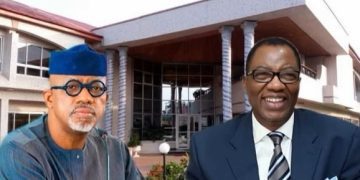By Jane Okafor, Abuja
The federal government has disclosed that if Nigeria hopes to meet its ambitious goal of attaining a per capita Gross Domestic Product (GDP) of $30,000 by the year 2050, the country must attract at least $100 billion in infrastructure investment annually.
Minister of Budget and Economic Planning, Senator Abubakar Atiku Bagudu, disclosed this when he received in his Abuja office, the new Japanese Ambassador to Nigeria, Mr. Hideo Suzuki.
Bagudu said that road infrastructure remains a vital pillar of the nation’s economy, given her dependence on land transportation for the movement of goods and services.
He revealed that the government is working out stronger partnerships with international allies like Japan to accelerate infrastructure development and unlock long-term economic growth.
He stated: “Our Agenda 2050 Long-Term Development Plan has identified a minimum annual infrastructure investment requirement of $100 billion if we are to meet our target of $30,000 per capita GDP by 2050. In alignment with President Bola Ahmed Tinubu’s eight-point agenda, we are also working toward building a $1 trillion economy within the next five years. This is an ambitious goal, and we are already more than 10 percent of the way there.”
The minister noted that Nigeria is addressing underinvestment in critical infrastructure and expressed optimism about the potential contributions of the Japanese International Cooperation Agency (JICA).
He explained that JICA’s global track record of delivering impactful development projects could play a significant role in Nigeria’s economic transformation.
He welcomed Japan’s growing development footprint in Nigeria and observed that the exchange of ideas and solutions between both countries will strengthen their respective goals and development identities.
Speaking earlier, Ambassador Hideo Suzuki provided an update on several Japanese-led development projects in Nigeria.
He stated that the “Data Collection Survey on Transport and Logistics in Nigeria” was progressing steadily and forms part of a broader collaboration with the Nigerian government.
The Ambassador also noted the Project for the Development of Supporting Environment for Startups and Addressing Social Challenges, signed in Abuja in April 2024. According to Suzuki, it is the first project of its kind ever launched by Japan globally and has already gained substantial attention in Tokyo due to its creative and inclusive framework.
Other key initiatives supported by Japan include the FCT Reduction of Non-Revenue Water Project; the Promotion of Market-Oriented Agricultural Extension Systems for Livelihood Improvement; and the Post-Harvest Processing and Marketing Pilot Project in Nasarawa and Niger States.
“These projects show Japan’s strong commitment to working with Nigeria in developing inclusive and effective solutions to real-world challenges,” Suzuki said. “We hope to deepen our engagement across sectors and contribute to Nigeria’s development aspirations.”
Suzuki officially resumed his role as ambassador following the departure of his predecessor, Ambassador Matsunaga Kazuyoshi, who served for four years in Nigeria.
Also speaking, Dr. Samson Ebimaro, Director overseeing the Office of the Permanent Secretary and Director of the International Cooperation Department, explained that the ministry’s mandate is to facilitate national growth by stimulating productive sectors and creating an environment conducive to investment.
“Delivering on key economic targets requires reliable and modern infrastructure systems, particularly in transportation,” he said. “This is central to boosting GDP and energizing economic activity.”









































